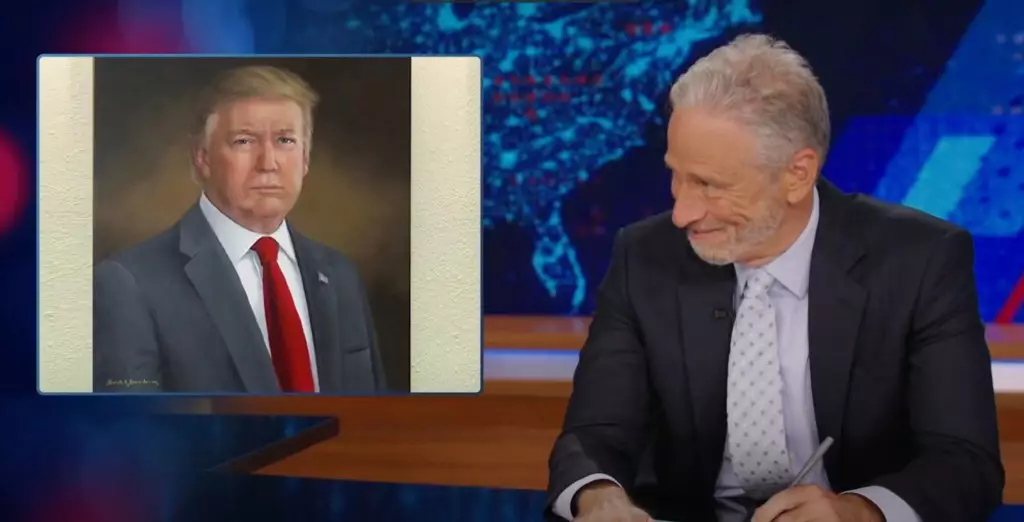In an era where free speech is often shouted from the rooftops, Jon Stewart’s recent monologue on *The Daily Show* serves as a sharp dagger piercing the heart of modern hypocrisy. Stewart’s astute observations capture the dissonance between what politicians advocate publicly and how they operate privately. His key assertion revolves around the Republican Party’s selective commitment to free speech, a topic they fiercely champion when it aligns with their agenda yet vilify when it threatens their ideological stronghold. This dichotomy raises profound questions about the nature of free expression in today’s political landscape.
Stewart begins his critique with a humorous anecdote, illustrating the ludicrousness of current governmental communication methods. He points out a recent blunder involving Secretary of Defense Pete Hegseth, whose group chat mishap led to a correspondence that could have significant ramifications. Stewart’s witty comment, comparing contemporary leaks to the clandestine operations of yesteryear, highlights a crucial shift in how information circulates in the age of technology. While once journalists had to navigate a labyrinth of relationships to uncover truths, today’s political players seem remarkably careless, inadvertently including unintended recipients in sensitive discussions. This reflects not only on individuals but also on a larger systemic failure.
Comedic Insight and Political Commentary
What makes Stewart’s commentary resonate lies in his ability to fuse humor with keen political insights. His examination of the Republicans, particularly those aligned with the MAGA movement, serves as an indictment of their inconsistent relationship with the notion of free speech. By suggesting that these political figures only advocate for the kind of speech that aligns with their beliefs, Stewart exposes a glaring contradiction. They are less concerned with upholding the principles of free expression than with maintaining a façade that serves their interests.
Stewart underscores the gravity of this hypocrisy, stating that the powerful often demonstrate an alarming lack of self-awareness regarding their positions. The rhetoric surrounding free speech becomes a tool rather than a value, manipulated to silence dissenting opinions while promoting a narrow narrative. In a sense, he argues that the right has redefined free speech as the privilege to speak without consequence, eliminating accountability for their actions and words.
Pop Culture as a Political Canvas
The insistence on connecting politics with pop culture is another fascinating aspect of Stewart’s analysis. The references to shows like *Watch What Happens Live* and *The White Lotus* serve not merely as comedic beats but as cultural touchstones that resonate with the audience. By juxtaposing political absurdities with well-known entertainment moments, Stewart effectively levels the playing field between the grave issues of speech suppression and the trivialities of reality television drama, illustrating that the lines between political discourse and entertainment are increasingly blurred.
His humor seems to challenge viewers to dissect not just the news but also the underlying cultural narratives that shape these discussions. Stewart’s comparison of the political landscape to a reality show ensures relatability, making complex themes about governance, rights, and freedoms accessible to the average citizen. He draws a portrait of a society entrapped by illusory narratives, oversharing, and the fetishization of free speech, all while diverting attention from the real issues at play.
The Call for Genuine Discourse
As Stewart navigates through clips featuring Donald Trump’s outrageous claims against media outlets, he highlights a critical collision between perception and reality. The call for media outlets to be penalized for unfavorable coverage becomes a paradox of sorts—an indictment of Trump’s actual disdain for free expression, masked beneath the guise of a populist agenda. The delightful irony in Stewart’s delivery—poking fun at Trump’s absurd demands while unearthing the hypocrisy of such sentiments—demands the audience to reflect on their own perceptions of speech and control.
Stewart’s message, while cloaked in humor, demands introspection into the values that guide our societal dialogues on free speech. Our collective responsibility to maintain a diverse discourse free from coercive pressures requires vigilance and a willingness to confront uncomfortable truths. Through his comedic lens, Jon Stewart urges us to seek authentic and robust discussions, to challenge systemic contradictions, and to hold powerful figures accountable—essentially reigniting the spirit behind the very concept of free speech itself.

